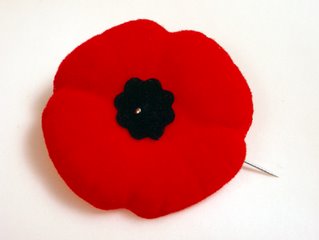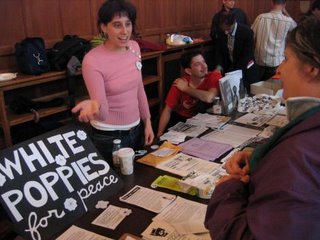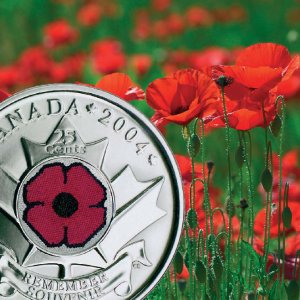 Just days before the observance of Remembrance Day, on November 11th, an article has appeared in the Canadian Press indicating just how out of touch with reality some veterans can be. I have the greatest respect for the veterans who have served our nation, especially in recent peacekeeping missions, but Remembrance Day is most especially about the observance of those who gave their lives in the “Great Wars”, though I bristle at calling the “First World War” anything more than an expression of everything that was wrong with the psychotic Imperialistic and royalist systems that had a stranglehold on world politics at the time.
Just days before the observance of Remembrance Day, on November 11th, an article has appeared in the Canadian Press indicating just how out of touch with reality some veterans can be. I have the greatest respect for the veterans who have served our nation, especially in recent peacekeeping missions, but Remembrance Day is most especially about the observance of those who gave their lives in the “Great Wars”, though I bristle at calling the “First World War” anything more than an expression of everything that was wrong with the psychotic Imperialistic and royalist systems that had a stranglehold on world politics at the time.That the assassination of on idiotic Arch-Duke should lead to the death of millions indicates a sign of a serious problem, not one that can be resolved by war, but one that must be dealt with through other means.
Morality of war notwithstanding, the accepted symbol of Remembrance Day has always been the red poppy, adopted because of the poem by Canadian Lieutenant Colonel, John McCrae (1872-1919), who wrote the famous poem “In Flanders Fields” while serving as a physician during WWI. The poem was written out of the experiences that McCrae witnessed, including having had to bury a friend the day before he wrote the text. In the end, he died from what ended up killing more than the bullets being fired: he succumbed to pneumonia and died in 1919 after a short illness.
 So why should a Canadian Press article be of any importance? For the simple reason that it points out the fact that the Canadian Legion is objecting to the fact that a group of people in Edmonton have been selling white poppies with the word “peace” in the centre as a symbol of their love of peace. The red poppy is seen everywhere during the period leading up to November 11th, and everyone in Canada who has been conscious for more than one year knows what it represents, so why should there be a problem with a white poppy that says peace?
So why should a Canadian Press article be of any importance? For the simple reason that it points out the fact that the Canadian Legion is objecting to the fact that a group of people in Edmonton have been selling white poppies with the word “peace” in the centre as a symbol of their love of peace. The red poppy is seen everywhere during the period leading up to November 11th, and everyone in Canada who has been conscious for more than one year knows what it represents, so why should there be a problem with a white poppy that says peace?It seems to me that the Canadian Legion, the organization that represents those individuals who have witnessed, first hand, the horrors of war, would be willing to do anything to prevent another generation from having to become members of their organization, but instead, the group in Edmonton has encountered intense resistance from Legion officials.
Harvey Shevalier, president of the legion's Alberta-Northwest Territories Command, said the poppy is a registered symbol of the legion and can't be used without permission. "The legion cannot condone it, and we cannot accept any attempt to use this poppy without authority or approval," he said.Now wait one second … the poppy may be a registered symbol, but that is the RED poppy … these guys didn’t use that one, did they? The Legion went on to say that using Remembrance Day as a “focus for a fundraising project of promotion of an ideal is completely inappropriate and unacceptable”. Now that, my friends, is the height of hypocrisy. For the month of October the Legion has their volunteers out in malls selling poppies to people. Selling; for money. Money, a substance used to pay for things, something that is used to keep organizations running.
The Legion says that this is the wrong time for fundraising, yet they do that for an entire month, and how is their displaying of military regalia at some of their sale sights not a promotion of a specific ideal? Having veterans dressed in their old uniforms with their medals is not what you can call a subtle hint that Remembrance Day is coming and you should buy a poppy from them, if you haven’t done so already.
 Thus, what must truly be objectionable to the Legion, which is the most puzzling thing of all, is that they must be opposed to the fact that this group in Edmonton is using their poppies to spread a message of peace, a message that does not have to be delivered with the destruction of life attached.
Thus, what must truly be objectionable to the Legion, which is the most puzzling thing of all, is that they must be opposed to the fact that this group in Edmonton is using their poppies to spread a message of peace, a message that does not have to be delivered with the destruction of life attached.When I first learned the lines of this immortal poem, as a child in grade school, the imagery that the poem conveyed to me was that of soldiers who had gone to the grave and were making these flowers grow by virtue of what they were contributing to the soil: the blood from their veins, the blood that had, only hours or days before been coursing through living, vital young men. My impression had always been that the poppies were red, blood red, because of the blood that had been spilled so copiously on the battlefield, a battlefield that was bleak with the stink of death that haunted every living thing that dared to enter its environs.
As a physician, a man dedicated to healing lives, not taking them would it be difficult to imagine that Lt. Colonel McCrae would have been offended by the symbolism of the white poppy? I rather think he would find it quite appropriate and more than fitting. The white poppy is not only a legitimate symbol of peace it still a symbol that represents the nearly 117,000 Canadians who died in war.
If all we do is remember those who died in war, Remembrance Day may as well be scratched off of the calendar: we must actively recall the full aspect of what war represents. It isn’t enough to talk about the sacrifices that Canadians made during the war, though this is something we must observe, and our veterans must be lauded and given everything that is due them for the service that they have provided this nation (and, in some cases, humanity). At the same time, when children learn about Remembrance day in school they must learn about the truth about wars, and about what is going on today, and about the forgotten “war” that is being forgotten and covered up by the press in the middle east while attention is focused on Iraq.
While the news services went crazy covering the midterm elections in the United States they had a perfect excuse to ignore the ongoing slaughter of innocent civilians taking place in Israel, all in the name of “self defence”. This is war, and should be observed on Remembrance Day. When I stand for my moment of silence at the 11th hour on the 11th day, this Saturday, my thoughts and prayers will be with those who have lost their families in the war being waged by the Zionist fascists in Israel.
Until every war has ended, until every citizen of the world can go to bed at night without the fear of some psychotic military officer ordering the firing of a few artillery shells at your house because it seemed like a viable target – the day before – until then, Remembrance Day is a day to remember that a lot of soldiers have died. We know that as a result of their sacrifice the Third Reich did not last nearly as long as its architects had planned, but other than that, what is different?
 As for the justice offered, or the veneer of peace in which we are supposed to be enjoying, that is all it is, a veneer: while one form of oppression has been replaced by another for many people in the world, the poppies continue to grow, the ground being fed by fresh blood with the passing of each day … and governments close to home continue to profit from war, almost as though it is a national industry.
As for the justice offered, or the veneer of peace in which we are supposed to be enjoying, that is all it is, a veneer: while one form of oppression has been replaced by another for many people in the world, the poppies continue to grow, the ground being fed by fresh blood with the passing of each day … and governments close to home continue to profit from war, almost as though it is a national industry.The one lesson we need to all take from the words of John McCrae is that there is not one single day for which we should be setting aside a moment to remember what it is we have as a result of the sacrifices of the veterans, and, consequently, what the horrors of war visit upon humanity.
“If ye break faith with us who dieBy “breaking faith”, could that possibly mean taking for granted the liberties we enjoy? Perhaps it would be a break of that faith to say to another group that using a white poppy with the word “peace” on it was something that was unacceptable at a time when we should be also repeating the words “never again”, and meaning them. No, it is, I fear, the Legion itself that has broken the faith and dropped the torch, having forgotten what the symbolism that McCrae was searching for truly meant.
We shall not sleep,
though poppies grow
In Flanders fields.”
As you read the poem just try to imagine yourself after Second Battle of Ypres. During an artillery attack a friend of yours is killed, and you, in lieu of a military chaplain bury him and perform the service. Then you write this poem …
In Flanders Fields
by John McCrae, May 1915
In Flanders fields the poppies blow
Between the crosses, row on row,
That mark our place; and in the sky
The larks, still bravely singing, fly
Scarce heard amid the guns below.
We are the Dead. Short days ago
We lived, felt dawn, saw sunset glow,
Loved and were loved, and now we lie
In Flanders fields.
Take up our quarrel with the foe:
To you from failing hands we throw
The torch; be yours to hold it high.
If ye break faith with us who die
We shall not sleep,
though poppies grow
In Flanders fields.
(Here is a link to a related BBC article, bringing the issue of religion into the debate.)
Tags:
2 comments:
Excellent article... I linked to it on my blog
It is sad to see Rememberance Day being used to drum up public support for imperialist wars. WWI was supposed to be the war to end all wars. That should be what we remember, and it should be peace that we look forward to on this day, not reaction and warmongering.
Thanks anonymous - I'll listen when I get a chance.
Thank you, Latour, for your kind words, and for linking to my article. The original article was actually brought to my attention by my mother, which I neglected to mention in my original post and would like to credit her with since I likely would have missed it until it was too late (damn these timely topical issues [grin]).
It is true what you say about the senselessness of WWI, and how the Russian soldiers finally abandoned the front, though their doing so was ostensibly to support the Czarist efforts to maintain control and fend off the Menshaviks (who only became the Bolshaviks after the success of the revolution … the term “Menshavik” meant, literally, minority … guess what the other means … you got it) as they ousted the stagnant Romanov empire.
I have always wondered what would have happened had the United States maintained their Monroe Doctrine during this time rather than getting involved in WWI … who would have won, and what difference would it have made? If Germany hadn’t been forced into the punitive Treaty of Versailles, would that have – perhaps – taken the wind out of the sails of the National Socialists in Germany, since it was the treaty and the economic results of war reparations that resulted in an intense depression in Germany. If that hadn’t occurred, would there have been an emergence of such an evil ideology, hiding behind a veil of economic promises of delivering the nation from the hardships inflicted upon the Fatherland by the west through the punitive Treaty of Versailles.
Truly, I have never understood the stakes of the “Great War”; never have I been able to comprehend the pros and cons of a particular side being victorious, and that is disturbing. In war, such as WWII, it is usually – normally – supposed to be – easy to recognize who should win: there should be a moral reason attached to the cause. WWII was easy as it represented the freedom of humanity, not just the prevention of wholesale genocide, but the enslavement of anyone who wasn’t “in the image” of the nazi psychosis.
Yet, when I look at WWI and all that was lost, it all seems to be such a waste, and for what? This was the war that truly represents the death knoll for imperialism and the royalist societies, for it was a result of these that so many innocent young people went to their deaths, believing that they were dying for “King and country”.
This is why, in Commonwealth countries, we sing the anthem “God save the Queen” (now, then – during WWI & II it was “God save the King”). The reason – they need saving for having sent so many innocents to their deaths (WWII notwithstanding).
God save the Queen; God save George Bush; God save Dick Cheney; God save Donald Rumsfeld; God save Condoleezza Rice; … on second though … God save us all.
Post a Comment